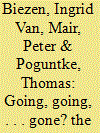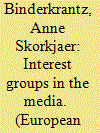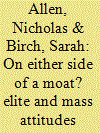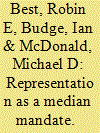|
|
|
Sort Order |
|
|
|
Items / Page
|
|
|
|
|
|
|
| Srl | Item |
| 1 |
ID:
111498


|
|
|
|
|
| Publication |
2012.
|
| Summary/Abstract |
This article offers an overview of levels of party membership in European democracies at the end of the first decade of the twenty-first century and looks also at changes in these levels over time, comparing party membership today with figures from both 1980 and the late 1990s. While relying primarily on the direct and individual membership figures as reported by the parties themselves, the fit of the data with survey data is explored and it is concluded that the two perform well in terms of convergent validity. The differences between large and small democracies are examined, as well as old and new democracies, and it is found that levels of party membership are related to both the size and age of the democratic polity in question. Finally, the implications of the patterns observed in the membership data are discussed, and it is suggested that membership has now reached such a low ebb that it may no longer constitute a relevant indicator of party organisational capacity.
|
|
|
|
|
|
|
|
|
|
|
|
|
|
|
|
| 2 |
ID:
111502


|
|
|
|
|
| Publication |
2012.
|
| Summary/Abstract |
A prominent presence in the news media is important for interest groups. This article investigates the development in the diversity of interest group media attention over time. The analysis draws on a dataset of 19,000 group appearances in the Danish news media in the period 1984-2003. It demonstrates how diversity has risen continually over time, leading to a media agenda less dominated by labour and business and more by public interest groups and sectional groups. This development is related to the increasing political importance of the news media and the decline in group integration in public decision-making processes. The article also shows how the development of group appearances is closely related to changes in media attention towards different policy areas.
|
|
|
|
|
|
|
|
|
|
|
|
|
|
|
|
| 3 |
ID:
111501


|
|
|
|
|
| Publication |
2012.
|
| Summary/Abstract |
This article develops a cognitive institutionalist account of mass and elite evaluations of political ethics, which is tested on a new dataset from the United Kingdom. The analysis explores the extent of contemporary disagreement among British political elites and those they represent by comparing responses to questions asked in a representative survey of the public with similar questions asked of incumbent MPs and parliamentary candidates. There are systematic differences between members of the public, candidates and MPs at both aggregate and individual levels - differences which can be accounted for with reference to the framing effects of Parliament as an institution. Candidates for parliamentary office display significantly more tolerance of ethically dubious behaviour than other members of the public. Within the elite category, elected MPs exhibit more permissive ethical standards than those candidates who are unsuccessful.
|
|
|
|
|
|
|
|
|
|
|
|
|
|
|
|
| 4 |
ID:
111497


|
|
|
|
|
| Publication |
2012.
|
| Summary/Abstract |
The extent and ways in which popular preferences influence government policy are absolutely central to our understanding of modern democracy. Paul Warwick's discussion of these in the European Journal of Political Research in 2010 puts itself at the heart of the debate with its critique of the median mandate theory of McDonald and Budge, proposing an alternative 'bilateralist' concept of representation. This article questions whether this concept has much to add to our theoretical understanding of representational processes. However, Warwick's further conceptual points deserve serious consideration. These concern the time horizons within which representative processes work, and the status of the median position given multi-motivated voting. At the evidential level, Warwick argues that survey-based measures of voter and party left-right positions fail to produce the correspondence between median and government policy positions that median mandate theory would have us expect. However, survey-based measures of median voter and party placements obscure important cross-national variation. Using the Comparative Study of Electoral Systems (CSES 2007), as Warwick does, this article shows that survey respondents norm their own and their country's party positions to their national context. The consequence is to make the political centre in all nations appear similar. Allowing for the relevant cross-national differences brings the relationship between the median voter and government position back in line with expectations.
|
|
|
|
|
|
|
|
|
|
|
|
|
|
|
|
| 5 |
ID:
111499


|
|
|
|
|
| Publication |
2012.
|
| Summary/Abstract |
The preceding article by Best, Budge and McDonald acknowledges much of the substance of the alternative 'bilateralist' interpretation of democratic governance I advocated and attempts to re-focus the median mandate approach towards a longer-term, and potentially more productive, understanding of the opinion-policy relationship. Both are welcome developments. Despite taking these steps, however, the authors choose to allow the fate of the median mandate thesis to rest ultimately on an attempt to re-establish the short-term one-to-one relationship that I challenged. In this brief note, I argue that this not only undercuts the more positive initiatives noted above, but also is based on a flawed understanding of how the short-term relationship should be operationalised and tested.
|
|
|
|
|
|
|
|
|
|
|
|
|
|
|
|
| 6 |
ID:
111500


|
|
|
|
|
| Publication |
2012.
|
| Summary/Abstract |
Parties have an incentive to take up extreme positions in order to achieve policy differentiation and issue ownership, and it would make sense for a party to stress these positions as well. These incentives are not the same for all issues and all parties but may be modified by other strategic conditions: party size, party system size, positional distinctiveness and systemic salience. Using manifesto-based measures of salience and expert assessments of party positions, the findings in this article are that parties emphasise extreme positions if, first, they are relatively small in terms of vote share; second, the extreme position is distinctive from those of other parties; and third, other parties fail to emphasise the issue. These findings have consequences for our understanding of party strategies, party competition and the radicalisation of political debates.
|
|
|
|
|
|
|
|
|
|
|
|
|
|
|
|
|
|
|
|
|